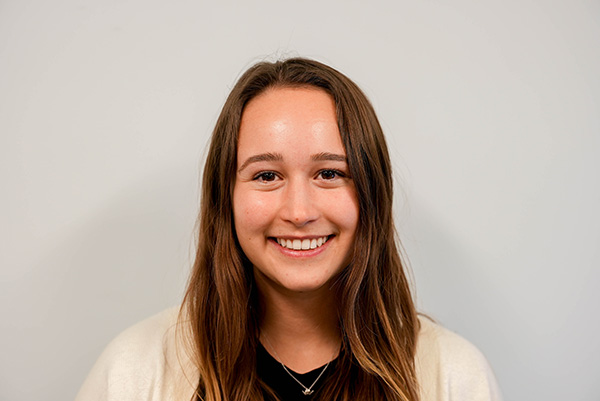Admissions
Equity, Diversity, Inclusion and Decolonization
The School of Graduate and Postdoctoral Studies is committed to equity, diversity, inclusion and decolonization in all aspects of graduate and postdoctoral studies. For more information regarding these commitments please visit grad.uwo.ca/edi-d.
Medical Biophysics
Doctor of Philosophy (PhD)Meet Ashley Micuda, PhD candidate in Medical Biophysics

Supervisors: Dr. Hanif Ladak and Dr. Sumit Agrawal
Why did you come to Western for your graduate degree?
I came to Western because of the translational research that my supervisors are doing. Their combination of engineering and surgical experience puts us in a unique position to both develop basic science techniques and apply them to a real-world problem.
Describe your research.
My research aims to develop a tool that customizes cochlear implant electrode selection based on each recipient's unique anatomy. Cochlear implants are a neural-prosthetic device that are surgically implanted into the inner ear to restore hearing for those with severe-to-profound hearing loss. By utilizing high-resolution imaging techniques, this tool will accurately measure intracochlear dimensions, incorporating safety constraints to ensure atraumatic electrode lengths are selected for all implant recipients. These findings will be translated into a deployable engineering software solution that will improve implant customization, ultimately enabling full cochlear coverage and increasing the hearing restoration range.
What are you most passionate about?
Improving quality of life for individuals, one patient at a time.
What’s the best advice you could give to someone considering applying to your graduate program?
Interview your supervisor as much as they interview you. The best way to succeed in a thesis-based graduate school is to choose a supervisor and lab that aligns with your values and goals.
Program Websites
Program Contact
Elizabeth Oliveira (askmbp@uwo.ca)Department of Medical Biophysics
Western UniversityMedical Sciences Building (MSB) Room #443
London, Ontario N6A 5C1
t. 519-661-2111 ext. 88030
f. 519-661-2123
The Department of Medical Biophysics works very closely with other university departments, research institutes, and hospitals in the City of London to offer unique graduate training opportunities in diverse fields including: cardiovascular disease, microcirculation, hemodynamics, biomechanics, and cancer. Biomedical imaging (CT, MRI, MRS, ultrasound, SPECT, PET-CT, PET-MRI, optical, photoacoustic) is a vigorous research area at the cellular, small-animal, pre-clinical, and clinical scale in our department. Our research program therefore gives students a chance to work with state-of-the-art equipment, often combining computational and experimental techniques.
The work of all our students, considered collectively, represents substantial accomplishments in a wide spectrum of physical, biological, and clinical science. Following graduation, you will find a rewarding career in the health care sector, biomedical industry, and academia; others pursue further training in professional schools such as medicine, dentistry, or business.

The Own Your Future doctoral professional development program will help you become a career-ready graduate with the skills necessary to excel in your studies and achieve your future goals. By participating in the program, you will assess your own strengths and opportunities for growth, choose what skills you want to enhance during your time at Western, and learn how to articulate the skills you gained in your degree to optimize your future career opportunities. To learn more, visit www.uwo.ca/ownyourfuture.
Program Length
- 12 Terms
Program Design
- Full-time study
- Thesis-based
Funding Information
Applicants are encouraged to apply for the following scholarships (if eligible):
Tuition and Fees
Tuition and fee schedules (per term) are posted on the Office of the Registrar's website at http://www.registrar.uwo.ca/student_finances/fees_refunds/fee_schedules.html
Graduate Student Affordability Calculator
Use this helpful tool to estimate how much money you will need to pay for your tuition, fees, housing, food, and other necessities for a 12-month (three term) academic year.
Admission Requirements
- A Master’s degree or equivalent from a recognized university or college, with preference given to those in a STEM (Science, Technology, Engineering and Math) discipline.
- Students with an admission average of >85%) who do not have a master’s degree will be considered for direct-entry placement into the program if space permits.
English Language Proficiency
Applicants whose first language is not English must furnish evidence of their proficiency in the use of the English language:
- The Test of English as a Foreign Language (TOEFL). iBT (internet-Based Test): The minimum acceptable score is 86, with no individual score below 20. PdT (Paper-delivered Test): The minimum acceptable total score is 65, with no individual score below 20. Please note that some programs require a higher minimum and/or band score. [Western's TOEFL ID is 0984].
- The International English Language Testing Service (IELTS Academic). The minimum acceptable score is 6.5 out of 9. The IELTS is offered in 6 test
centres in the US and 3 in Canada. - The Canadian Academic English Language Assessment (CAEL Assessment). The minimum acceptable score is 60. The CAEL Assessment is offered in several countries throughout the world as well as Canada.
- Western English Language Centre. The requirement is successful completion of the High-Advanced level.
- Fanshawe College’s ESL Program. The requirement is graduation from Level 10, English for Academic Purposes, with a minimum 80% in all components.
Application Deadline
- June 1 – Fall Term
- November 1 – Winter Term
- March 1 - Summer Term






